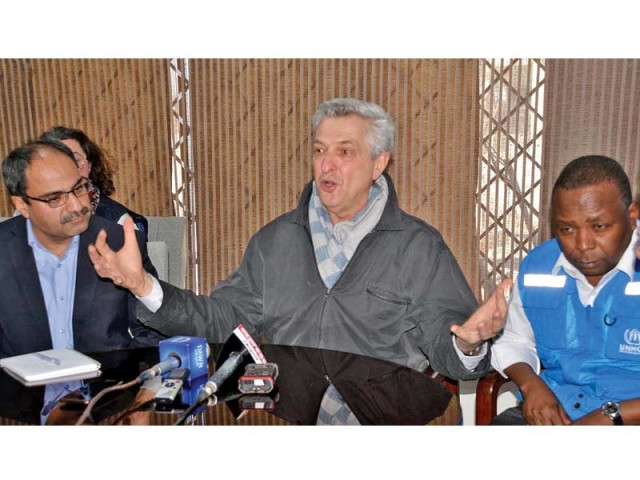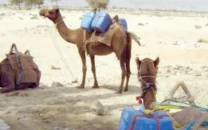Afghan refugee crisis not over yet: UNHCR
Filippo Grandi says Pakistan has faced several challenges, sacrificed a lot

UN High Commissioner for Refugees Filippo Grandi addresses a press conference in
Quetta. PHOTO: INP
“We know Pakistan has faced so many challenges and sacrificed a lot," he said while speaking to media in Quetta on Saturday ahead of ‘International Conference on 40 Years of Hosting Afghan Refugees in Pakistan: A New Partnership for Solidarity’ scheduled to be held in Islamabad on February 17 (Monday).
The conference is being co-hosted by the Pakistan government and the United Nations refugee agency and will be attended by Secretary General Antonio Guterres and UNHCR chief Filippo Grandi.
Grandi said UNHCR wants to use the opportunity to tell the world powers that they need to share the burden more on the issue. "In the past, it was easier to mobilise resources as it was a political issue globally. But now, it is on the contrary,” he added.
The high commissioner said he wanted to visit the provincial capital during his current visit.
"This is my third visit to Pakistan as high commissioner though I have visited the country several times. I was very keen to visit Quetta during my current visit.”
Acknowledging that Khyber Pakhtunkhwa (K-P) province is hosting the largest number of Afghan refugees, Grandi said efforts of Balochistan should also be recognised as it hosts the highest number of Afghan refugees (0.35 million) after the K-P.
He declared that crisis of refugees is not yet over as the security situation in Afghanistan is still fragile.
"Until the crisis is resolved, people would not go back in large numbers. We not only want to ensure support for Afghan women but also women of the local community. The important objective is to strengthen Pakistan's health sector and school services as refugees also use these facilities,” he added,
He said provision of health, education and livelihood remains the UNHCR priority with fourth important sector being the environment.
“Pakistan is currently hosting 1.4 million registered Afghan refugees. Some of them have passports while other half a million are not registered, which means more than two million Afghans are living in Pakistan," the high commissioner said.
“In 1990s and 2002-3, a large number of Afghan refugees returned home, while 300,000 people went back to Afghanistan in 2016,” he added. The UNHCR chief noted that the recent political developments in Pakistan would help in the repatriation of Afghans to their country. He said lack of employment and education opportunities in Afghanistan is also a reason why the Afghans do not want to return to their country.
Published in The Express Tribune, February 16th, 2020.



















COMMENTS
Comments are moderated and generally will be posted if they are on-topic and not abusive.
For more information, please see our Comments FAQ